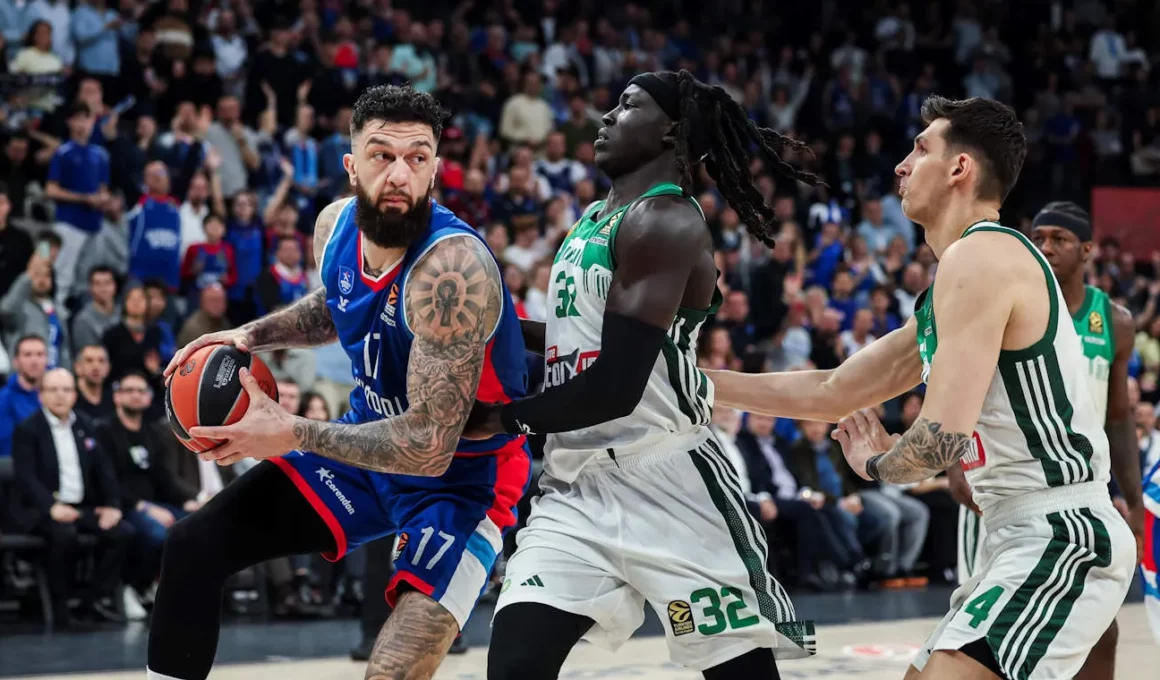I have to challenge the Australian-born former Duke player who really missed the mark with the phrase, “I Come from the Land Down Under.”
Just to clear things up, “Down Under” doesn’t imply that the Earth is flat. In reality, the Earth is a globe. Seriously Kyrie, it’s a globe, it’s not flat.
Sadly, a lot of Americans cannot locate Australia (o Europe) on a map.
So…to give some context for our American readers:
The United States is about 248 years old.
Meanwhile, the Roman Empire constructed massive city walls, around 10 meters high (33 feet), that still stand in my adopted home of Lugo in Galicia.
Those walls were built around 276 A.D., making them and the city roughly 1,510 years older than the USA!
The USA is, relatively speaking, an infant.
With this being said, onto our topic:
I’m often asked by American college and NBA basketball fans about how European basketball is organized so I will break it down.
Professional Basketball in Europe: A Force to be Reckoned With
Basketball here has evolved into a highly competitive and well-organized professional sport, standing strong against the National Basketball Association (NBA) in areas such as talent cultivation, fan involvement, and structural organization. With its historic teams, elite leagues, and a robust system for nurturing new talent, European basketball is a firmly established entity.
The Framework for European Basketball clubs
The landscape of professional basketball is made up of various national leagues, each overseen by its own federation. Notable leagues include Spain’s Liga ACB, Italy’s Lega Basket Serie A, Germany’s Basketball Bundesliga, and Turkey’s Basketball Super League. These leagues function on a promotion and relegation system, contrasting with the franchise model of the NBA.
Club Basketball and National Leagues
This is where basketball clubs compete against clubs in their own county.
European clubs are known for their rich traditions, dedicated fan support, and competitive styles of play. Teams like Real Madrid, FC Barcelona, Efes Pilsen, and Olympiakos just to name a few have achieved significant status through their domestic and international accomplishments. These clubs often focus on developing young talent, many of whom eventually make their way to the NBA. Nevertheless, the high level of competition in European leagues offers a strong alternative for elite players who either do not reach the NBA or decide to return after their time there.
The Euro League and International Competitions
This is where clubs of one country compete against other countries clubs.
The Euro League represents the highest level of club basketball in Europe, showcasing the top teams from across Europe.
It features a regular season followed by playoffs, leading to the much-anticipated Euro League Final Four. Alongside the Euro League, other prestigious tournaments like the Euro Cup and the Basketball Champions League offer teams a chance to compete at an elite level beyond their national leagues.
European Players in the NBA
In recent decades, European players have left a remarkable mark on the NBA. Icons such as Dirk Nowitzki, Pau Gasol, and Tony Parker set the stage for today’s stars, including Giannis Antetokounmpo, Luka Dončić, and Nikola Jokić. Many of these athletes honed their skills in European leagues before transitioning to the NBA, showcasing the exceptional talent cultivated in Europe.
Differences Between European Basketball and the NBA
A key distinction between European basketball and the NBA is the style of play. European basketball focuses on teamwork, disciplined ball movement, and a more strategic, slower pace. In contrast, the NBA is characterized by individual athleticism, rapid gameplay, and high-scoring encounters. Additionally, European games are shorter, lasting 40 minutes compared to the NBA’s 48 minutes, and feature a different three-point line distance, which influences the dynamics of the game.
Women’s Professional Basketball in Europe: An Emerging Power
Women’s basketball in Europe has evolved into a competitive and well-organized professional sport, highlighting exceptional talent, enthusiastic fan support, and strong governance. With historic clubs, elite leagues, and a solid pipeline of rising stars, women’s basketball in Europe is steadily gaining prominence and impact on the global scene.
The Framework of Women’s Basketball Clubs in Europe
As with the men the landscape of professional women’s basketball clubs in Europe consists of various national leagues, each overseen by its own country’s federation. Notable leagues include Spain’s Liga Femenina, France’s LFB (Ligue Féminine de Basketball), Turkey’s KBSL (Kadınlar Basketbol Süper Ligi), and Russia’s Premier League.
These leagues also operate under a competitive structure that allows for promotion and relegation, a big difference from the franchise model of the WNBA.
Club Basketball and Domestic Leagues
This is where basketball clubs compete against clubs in their own county.
They boast rich traditions and passionate supporters. Teams such as UMMC Ekaterinburg, Fenerbahçe, ZVVZ USK Praha, and Perfumerías Avenida are top examples. These organizations play a vital role in nurturing talent and offering top-tier training.
Euro League Women and International Competitions
This is where clubs of one country compete against other countries clubs.
Euro League Women stands as the top-tier competition for club basketball across Europe, uniting the finest teams in a regular season followed by playoffs. The season culminates in the Euro League Women Final Four, showcasing the elite talent in women’s basketball. Additionally, the Euro Cup Women acts as a secondary continental tournament, allowing more clubs to engage in international competition.
European Players in the WNBA
Numerous European athletes have made successful transitions to the WNBA, significantly impacting the league. Prominent players like Ann Wauters, Sandrine Gruda, Emma Meesseman, and Alba Torrens exemplify the exceptional talent cultivated in European leagues.
Many of these athletes continue to play overseas during the WNBA offseason, further enriching the competitive environment of women’s basketball globally.
Differences Between Women’s Basketball in Europe and the WNBA
There are distinct contrasts between women’s basketball in Europe and the WNBA, especially in terms of playing style.
European basketball emphasizes teamwork, disciplined ball movement, and a strategic approach.
Conversely, the WNBA highlights athleticism, fast-paced action, and high-scoring games. Additionally, European leagues feature different game lengths (40 minutes, similar to the WNBA) and variations in the distance of the three-point line.
The Future of Women’s Basketball in Europe
As women’s basketball gains momentum around the globe, European leagues are stepping up to draw in top talent, enhance facilities, and broaden their fan base. Increased investment in the sport, improved training initiatives, and expanded media visibility have all played a role in its swift advancement. While many players still view the WNBA as a key career goal, European basketball provides a robust environment for high-level competition and professional growth.
In summary, women’s professional basketball in Europe has established itself as a powerful force in the international sports arena. With rich club histories, competitive leagues, and a growing number of European athletes making their mark in the WNBA, the sport is thriving, positioning Europe as a vital center for the development and enjoyment of women’s basketball.
NATIONAL TEAMS
This is where one country competes against other countries both men and women.
Basketball national teams represent their countries with pride in international competitions, bringing together top home-grown players to compete at the highest level. They participate in major events like the FIBA Basketball World Cup, the Olympic Games, and regional tournaments such as EuroBasket, the FIBA Asia Cup, and the FIBA AmeriCup.
The United States stands out as one of the most successful teams, particularly in the Olympics, due to its large pool of NBA talent. Other strong teams include Spain, France, Argentina, and Serbia, which have achieved success globally thanks to their organized basketball programs and talented players. National teams do more than just win titles; they inspire young athletes, promote basketball worldwide, and create unforgettable moments for fans. Rivalries, such as the USA versus Spain or Argentina against Brazil, add excitement to the sport. Additionally, national teams help develop basketball in emerging nations by providing a platform for new talents to gain international recognition. In conclusion, basketball national teams play a crucial role in the sport’s global appeal. They represent not only skill and competition but also national identity and the unifying spirit of basketball. Their achievements continue to elevate the game and inspire future generations of players.
The Future of European Basketball
As basketball continues to globalize, European leagues are increasingly drawing in top talent, enhancing their facilities, and expanding their media reach. The focus on nurturing young players, adopting advanced coaching techniques, and investing financially in clubs has firmly established Europe as a dominant force in the basketball world.
While the NBA/WNBA remains the ultimate aspiration for many athletes, European basketball has emerged as a premier arena for competition, cultivating exceptional talent and engaging fans across the globe.
In summary, with its rich club traditions, competitive leagues, and a growing number of European athletes making their mark in the NBA/WNBA, the sport is thriving, positioning Europe as a vital center for basketball growth and entertainment.
In Closing
The NBA has long considered Europe as a potential area for expansion, and recent reports indicate that this initiative is still ongoing. A notable example of this is the gradual alignment of rules and regulations governing the game. The NBA and FIBA are expected to continue to collaborate in order to maintain their global presence.
I trust these explanations provide clarity regarding European organizational structure.
Regarding the views expressed by our Australian-born former Duke player Kyrie Irving, it is important to clarify that if anyone attempts to dunk a basketball in Australia, they will not float away into the stratosphere. I can assure you of this.
Artículos de opinión
Redes sociales:
X: @TimShea03304927
Facebook: Tim L Shea
Instagram: tim.shea49









